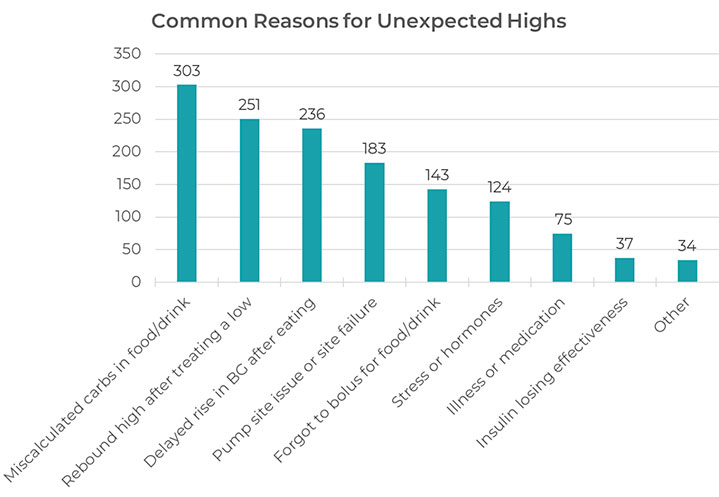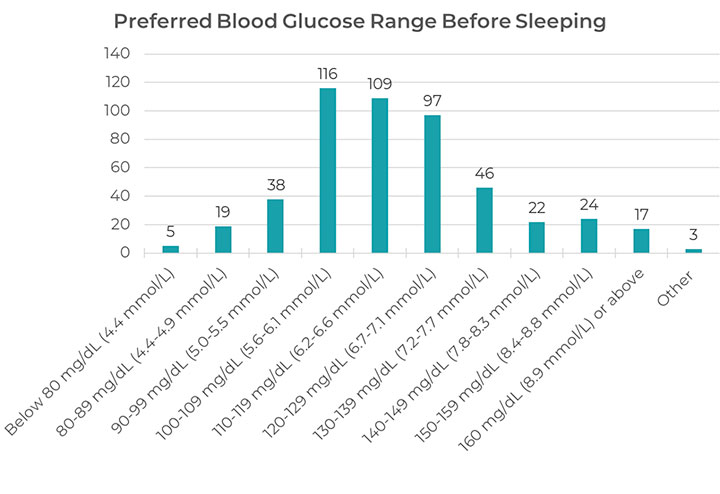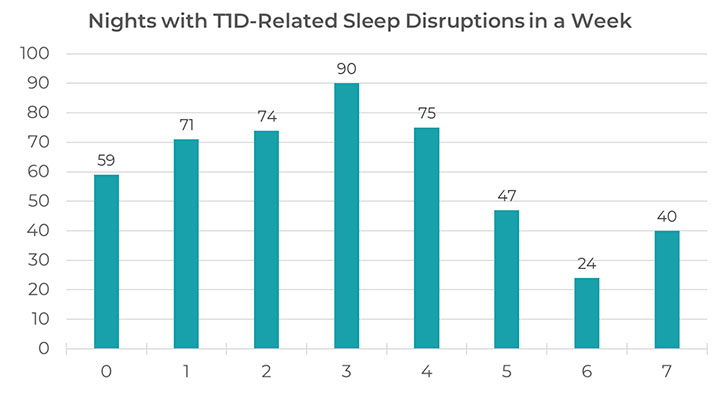
Sign up for a new account.
And get access to
The latest T1D content
Research that matters
Our daily questions
Sign up by entering your info below.
Reset Your Password
Don't worry.
We will email you instructions to reset your
password.
We learn something new every day from the T1D Exchange Online Community’s Question of the Day responses.
Here’s what we learned from the 3 most popular questions of April 2022:

When you have unexpected high blood glucose (BG) levels, what are the most common reasons why?
April’s most answered Question of the Day was inspired by a conversation between several T1D Exchange staff members who all live with T1D, during which we all realized that when dealing with unexpected high BGs, our immediate assumptions about the causes of the high were all different. For example, one person knows she tends to underestimate carbs, one person knows her highs are often caused by hormones, and another person knows she usually eats while multitasking and forgets to bolus.
Of course, we all have experienced many of the items on this list, and many of these unexpected high BGs have no obvious cause. However, when asking our community about what they think causes these unexpected high BGs, the three most selected options were miscalculating carbs, rebounding after treating a low, and delayed rises in BG after eating.
Here are some of the comments with the highest engagement from the community:
- “Fascinating and somewhat expected the way answers are grouping up trying to determine ‘most common.’ I’d have added another answer, though, under ‘other,’ such as ‘Damned if I know?’”
- “I put ‘other’ because most of the time, I have no idea why I went high. I can eat the same thing for lunch 3 days in a row, with my starting BG in the same range, and one day I’ll be fine after eating, one day I’ll go high, one day I might go low.”
- “Dx 67 yrs ago this week. I could have checked most of the boxes. Too much is still a wild guess.”
- “I get rebound highs after lows even if I really didn’t go low. Example, I might get a rebound high (go up to 160 or more) after eating 4 grams of carbs to raise my sugar which never got lower than 75.”

Although it may vary based on different circumstances for you, on a typical night, in which of these blood glucose level ranges would you most prefer to be before going to sleep?
The second most answered Question of the Day in April aims to assess what BG levels people would ideally have before going to sleep at night. The most commonly selected option was between 100-109 mg/dL with 23% of responses, and the second most selected option was 110-119 mg/dL with 22%.
One community member pondered whether this is a mathematical question or a psychological question? The answer is a bit of both. This question asks a person to select the option that best balances their preferred BG level for their health, and their preferred BG level for their peace of mind while sleeping.
Here are some thoughts that our community members shared:
- “…I have this deep-seated fear of going to bed ‘too low,’ which compels me to enter anything up to 200. I suppose Sigmund Freud would have a field day about this subconscious compulsion. However, it forces me to ask, ‘Is this a mathematical question or a psychological question?’…”
- “110-120 would be optimal for me. Seems like that’s where Control IQ has me. Wiggle room to get out of a low and not too high. Control IQ, I love you!💕😘❤”
- “️I actually cannot get to sleep unless my BG is about 119 or higher. I would prefer to aim lower, but cannot. Somehow no matter how tired I am I cannot sleep…Once I am asleep, if I wake up to go to the bathroom, sometimes my BG has fallen below 100, but I have to have some glucose to get back to sleep…”
- “I have had too many episodes at night, so I’m quite comfortable to be over 160 before bed. If the level is still high in the early morning, I can always lower it for breakfast.”

In the past week, how many nights was your sleep disrupted by device alerts, checking blood glucose levels, or treating a high or low?
This question showed a wide range of responses, with the most common response being 3 nights of sleep disturbed by T1D in a week at 19% of the votes.
12% of people responded that T1D had not interrupted their sleep at all in the past 7 days, but 39% reported losing sleep due to T1D more than half of the nights in a week.
Many community members mentioned experiencing changes in their lives that cause their sleep to be disrupted more than usual. As we know, life with T1D is constantly changing, and it is great to see community members showing solidarity with others going through similar experiences.
Here are some comments that resonated with the community:
- “I answered “7”. But, normally, I would have probably said 1. Seven this week because my doctor had me on Prednisone. What a nightmare that was. I was taking up to 4 times the amount of insulin that I usually use. I changed my pump profiles and temp. basal rates a half-dozen times each day.”
- “Been there with steroid shots in hip. Feel for you. It was a nightmare. Short time for me thankfully but I understand and sympathize.”
- “I’m in one of those times when my digestion seems extra slow, so my supper carbs hit after I’m in bed, sometimes as much as 3 to 4 hours after the meal. So my number was higher than normal (4 nights).”
- “I also have the slow digestion experience. I think I’ve now spotted what foods cause the delay. Then I have a second fast acting injection about 3 hours after the first. Seems to work for me, except I still don’t get it right every time.”
Thank you to every member of the T1D Exchange Online Community for sharing your experiences. Your words inspire others who come to this community for advice and to know they’re not alone.
If you are not already a member of the T1D Exchange Online Community, join us by clicking the “Join” button in your upper right corner!







